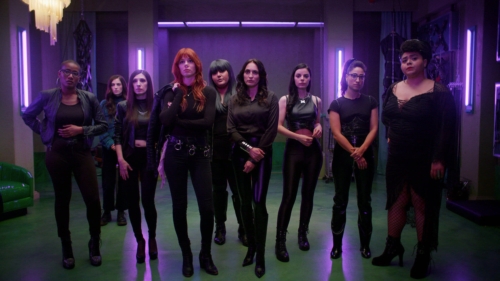The season 2 finale wraps up various plotlines.
Portia has departed, but she left a note for Frank instead of ghosting him.
Rolph still hangs out with Pete, apparently as his “friend who knows your whole schedule” rather than his submissive. Pete has put Josh behind him, but is still uncertain about Tiff, and his career in comedy.
Tiff and Doug have reconciled. She says she loves him, and knew it was because she was vulnerable to him. She even offers to show him around the dungeon sometime.

Pete now has an agent who wants to put him, or rather “Master Carter”, on the late comedy show circuit. Pete himself doesn’t look entirely comfortable with being known for a gimmick rather than himself.
The agent himself is a bit strange, as during his meeting with Pete he launches into a story about him consensually strangling and spitting on a woman he had sex with.
Agent: “I want to sign you. I love the look, the vibe, the lifestyle, the leather. I love it all. And this set is killer.”
Mira announces to Tiff and the other dommes that she is closing her dungeon, having been pushed out by her landlord. She also says it has taken a toll on her finances and her personal life. She calls what they do a “craft.” She also says, “This is a business, but it is also a sisterhood.” She urges them to support each other in their own work.
Tiff admits to Mira that she used MJP’s credit card to pay for Portia’s hospital visit and a plane ticket back to London. While that’s probably pocket change to a guy like MJP, it’s still a violation of the terms between him and Mira, and Mira should really make a bigger deal about it.
Tiff also says she’s not going back to grad school. “This is normal. Normal enough for me, anyway.”
Pete talks to Tiff about going on a late show with his comedy routine.
Pete: “I came here to ask you for your permission to do that material again.”
Tiff: “I thought you were coming here to apologize.”
Pete: “It’s my story too.”
Tiff: “Then do whatever you want, Pete.”
Pete: “Is that a ‘yes’? A verbal ‘yes’?”
Tiff: “No. You didn’t come here for my consent. You came here for my approval. And you have neither.”
Pete: “You know, at the beginning, you didn’t have my consent. You just did what you wanted.”
Finally, Pete says, “I don’t want to be owned anymore. It’s my turn to leave you.” He gives her the collar that she casually discarded. This doesn’t work, as Tiff wore that collar as a fashion accessory, then discarded it. Pete picked it up of his own accord, then had Josh put it on him. It was never an important symbol in their relationship, though it may reflect how Pete felt he was Tiff’s “slave”, his life subservient to hers.
Tiff and some of the other dommes collaborate on acquiring a space to be a new shared dungeon.
Pete looks less than comfortable, in his mask and leathers, in a room full of guys in suits.
As I’ve said before, Bonding presents itself as a show about BDSM, when it’s really more about the pro-domination subset of sex work, which overlaps somewhat with BDSM. That’s reflected in Pete and Tiff’s search for their identities.
Tiff starts out in season 1 as someone who’s in it for the money to pay for her school, and over season 2 she grows into someone who appreciates the profession of pro domination, learns the craft, and adopts it as part of her identity, with all the responsibilities that implies. Through Mira, she learns how being powerful does not mean closing yourself off from other people.
Pete’s identity is more complicated and unsettled. Initially, Tiff press-gangs him into being her assistant with money and emotional dependence. Along the way, he gets into it for his own reasons, testing his own boundaries and becoming more assertive. His relationship with Josh includes at least some dom-sub play, he hangs out at gay leather bars, and his success in stand-up is based on his gimmick of being the “dom twink comedian.”
However, he just can’t color within the lines. When Tiff pulls him along to Mira’s course, he’s there to please her, not for his own reasons, and goofs off. Tiff wants to be professional, but he keeps pushing the limits and jeopardizing her future. His appreciation of BDSM is mainly aesthetic, at least at this moment.
The season ends with Pete’s identity still in flux. “Master Carter” started as a nom de scene and has grown into something more, the Mr. Hyde to Pete’s Dr. Jekyll. His gimmick has brought him to the attention of the mainstream. We see of him is sitting in his leather gear in an office full of men in suits, like a performing monkey. The fear is that his material success may come at the expense of the community who showed up for his comedy shows.
This parallels the development of Bonding itself. In season 1, it treated BDSM as a Netflix-friendly gimmick to attract attention while the main emphasis was on Pete and Tiff’s codependent relationship. In the season 2, it made an abrupt course correction and introduced the idea of a BDSM community. Being a pro-domme isn’t just a quick and easy way to make money from isolated weirdos; it requires skill, empathy and connection.
Even in season 2, the show is still focused on the pro-dom world, and only hints at the larger world of non-commercial BDSM. Representing the BDSM subculture now ranks higher on the list of priorities, but it’s still far from the top.
William Friedkin, who directed the notorious film Cruising (1980), once said in an interview:
“…that world [of gay leather] was only background to a murder-mystery. I never really intended to make a statement about gay life or the gay world. It was just an exotic background that mainstream audiences had not seen – those people who didn’t go to see pornography.”
[Williams, Linda Ruth. 2005. The erotic thriller in contemporary cinema. Edinburgh: Edinburgh University Press. Pg.135]
I don’t think Friedkin was being disingenuous. He just didn’t care about issues of representation. Likewise, I think Bonding’s creator, Rightor Doyle, was primarily interested in telling the story of Pete and Tiff’s relationship, and the pro-dom stuff was “just an exotic background that mainstream audiences had not seen”, the gimmick that got it picked up by Netflix. Only belatedly did the producers realize that there was a community that objected to the way they were being represented. That they tried to correct this is to their credit.




I agree that the show is more about Tiff and Pete.